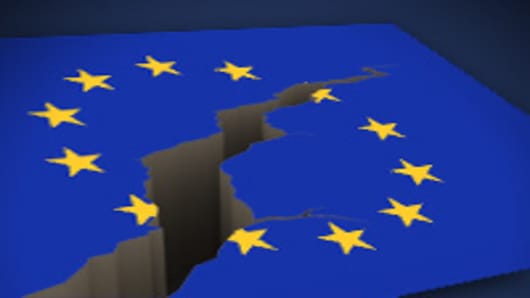Stocks in Asia surged on Thursday, after the coordinated action by global central banks to provide cheaper dollar funding to European banks spurred massive gains on Wall Street. But according to a number of analysts CNBC spoke to, the rally is unlikely to last, as the move merely bought time for European leaders and doesn’t solve the euro zone’s fundamental debt problems.
"This liquidity is definitely something that's addressing the symptoms of the problems, but we really need the Europeans themselves to be attacking the cause and the solvency issues," said Nick Bennenbroek, Head of Currency Strategy at Wells Fargo in New York.
Michael McCarthy, Chief Markets Strategist at CMC Markets in Sydney said the stock surge was typical of a bear market rally. "Right now Europe needs a leader, somebody who can take this situation by the scruff of the neck and bring all of European interests to bear to get them to act in concert," he added.
Europe's already crippling debt crisis is set to worsen in 2012, when many of the region's governments are forced to refinance huge amounts of debt. According to Ilian Mihov, a professor of Economics at the INSEAD business school, Italy alone will have to roll over 400 billion euros ($538 billion) in 2012, about 20 percent of its total debt. With yields on bonds at 7 to 8 percent, that could be difficult, he added.
The only solution, say experts, is for Europe to move towards a closer fiscal union or for the European Central Bank to buy more sovereign bonds. EU leaders meet on December 9 and analysts say finding a solution by then is crucial.
Wells Fargo's Bennenbroek says Europe can try and get help from Japan or China, but those countries were unlikely to buy sovereign debt without first seeing a clear solution from the bloc.
In the meantime, most experts are forecasting a rate cut from the ECB when it meets on December 8, which could boost risk assets in the short-run.
Bennenbroek is predicting a 25 basis point cut, while INSEAD's Mihov expects a cut of 50 basis points, taking interest rates to below 1 percent. "If you look at Mario Draghi, he's more aggressive, more willing to act than Trichet was," said Mihov.



